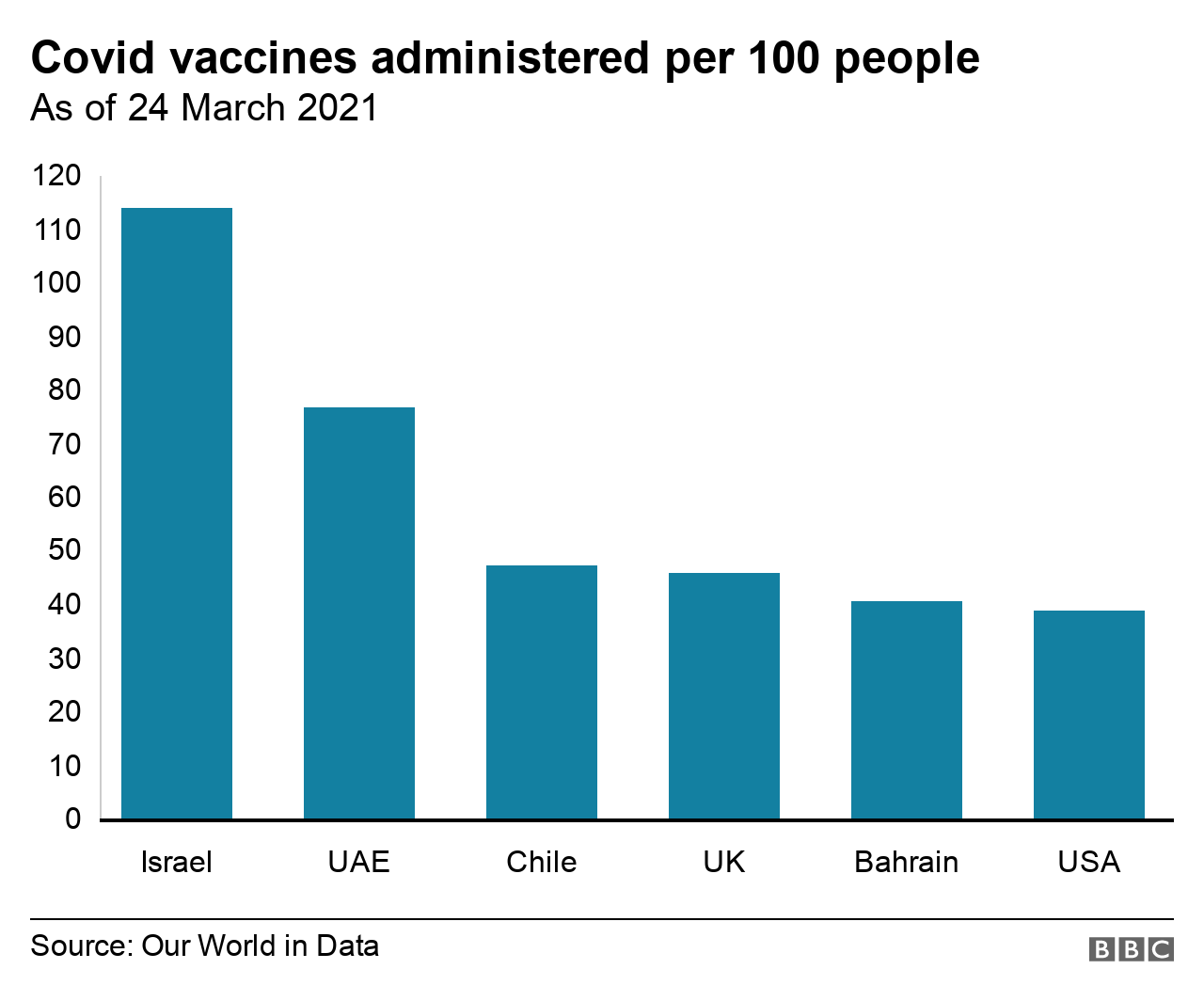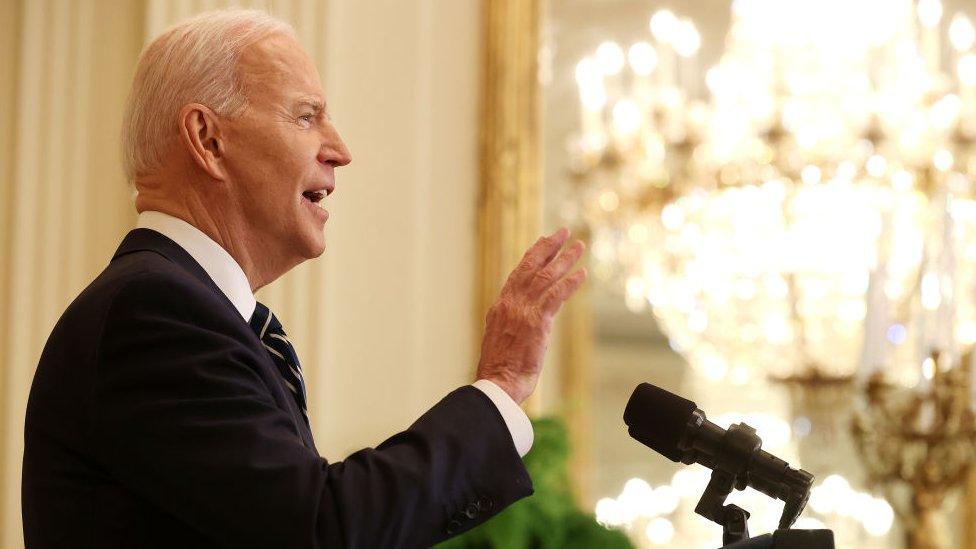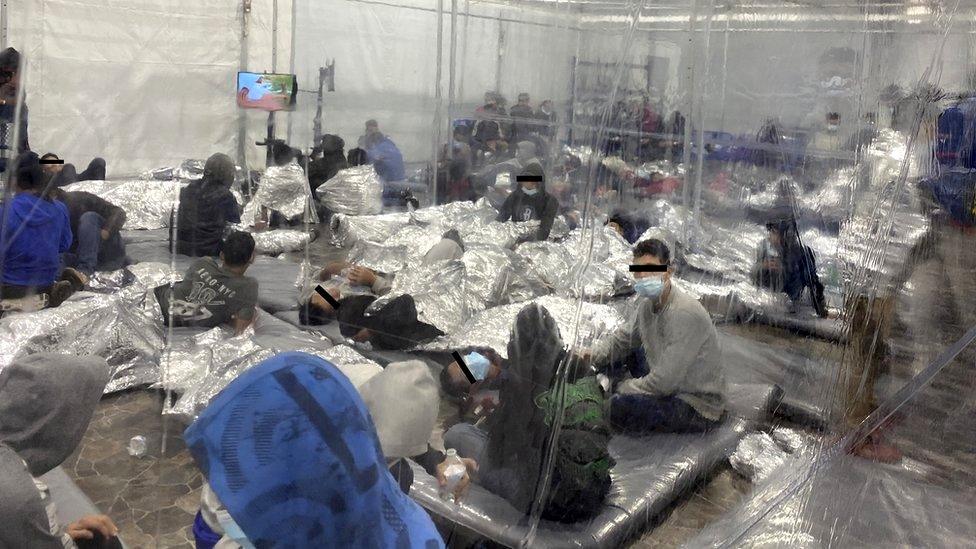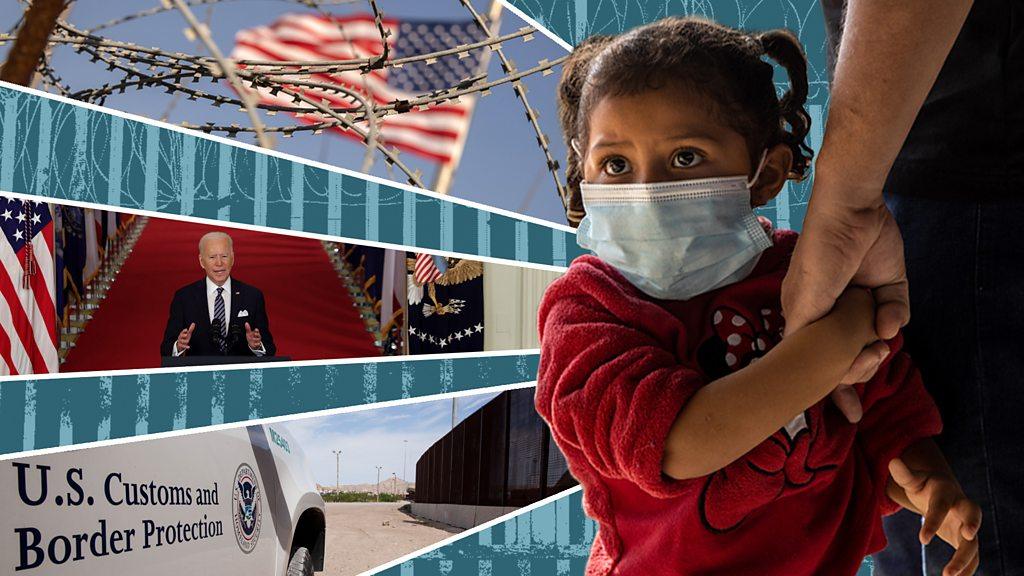Key takeaways from President Biden's first news conference
- Published
"My predecessor - oh God, I miss him" - and other news conference highlights
Joe Biden waited longer than any modern president to hold his first solo press conference, turning what should have been a relatively routine event into a high-profile media spectacle.
With expectations raised, Biden took to the East Room of the White House and addressed a socially distanced group of reporters.
Here are some key takeaways from the occasion.
A change of tone
What a difference an election makes. Donald Trump's press conferences were like a no-holds-barred cage match, where the commander-in-chief tried to prove his dominance over his media critics.
Biden's performance was more akin to a cautious walk across a not-quite-frozen lake. Every step was careful and calculated, lest an unexpected crack led to a dark, icy fate.
He relied heavily on notes and called from what appeared to be a pre-determined list of reporters - one that didn't include Fox News or any other right-leaning outlets.
At one point, in an answer about the filibuster - an arcane Senate rule that has thwarted many a president's ambitious agenda - Biden appeared to lose his train of thought, ending his sentence with the wave of a hand.
It wasn't exactly a bravura performance, but conservatives have set the bar so low for Biden's coherence, that as in the presidential debates, Biden was able to surpass most expectations.
A shot in the arm - 200 million, in fact
Before he took questions from the gathered journalists, Biden gave a few prepared remarks, and his focus was on the twin crises he inherited as president, the coronavirus pandemic and the resulting economic turmoil.
He led with a newsworthy promise that, by his 100th day in office, healthcare workers will have distributed 200 million vaccination jabs (that's very good news, although the US still lags behind some other countries when comparing the number of jabs done relative to the size of the population).


He also boasted about the economic aid package he shepherded through Congress on the back of universal Democratic support - a fiscal shot-in-the-arm that should help the economic recovery.
"Help is here," he said. "Hope is on the way."
Reporters didn't spend any time asking about the pandemic or the economy after that, which was another big clue that the Biden administration has - at least in their minds - done a good job addressing the biggest challenge of his presidency so far.
Under pressure on immigration
One topic Biden was repeatedly pressed on by reporters was the deteriorating situation at the US-Mexico border, as a growing number of undocumented migrants - including unaccompanied children - are being detained by US border patrols.
Biden didn't have much new information to share, an indication that he would prefer the headlines from the press conference to be about other topics. When he did speak on the topic, he blamed Trump for cutting aid to Central American countries that could have address the root causes of humanitarian crisis. He said the surge in entries was cyclical in nature and not a result of immigrants believing he was a "nice guy" who would let them in. He also promised that if the processing of children at the border wasn't improved, he'd start firing people.
The challenges facing Biden at the US-Mexico border
Biden very rarely mentions his predecessor by name, but when asked about his policy of admitting unaccompanied children into the US, it's exactly what he did. He wasn't going to turn children away to starve, he said. "No previous administration did that either, except Trump," he said. "I'm not going to do it."
Democrats have criticised Trump's immigration policies as draconian and heartless. Biden's task, whether he wants to talk about it or not, is to prove that there is a better way.
Infrastructure is next
When one journalist offered a laundry list of topics that Biden might tackle next, and asked how he would work with Republicans to accomplish them, Biden at first deferred. Immigration, gun control, voting rights, climate change - those were all "long-term problems," he said.
But later, Biden tipped his hand on what his next priority will be - a massive infrastructure spending bill.
The idea of "infrastructure week" had become a running joke during the Trump presidency, as the White House made multiple futile attempts to prioritise new spending on large civic works projects as a way of boosting jobs and helping the economy. It appears team Biden will take their own crack at it, although their effort will include more spending on green-energy projects and could include a boost to the minimum wage.
Of all the potential items on Biden's agenda, infrastructure could be the most likely to get some Republican support, which - after a partisan pandemic aid bill - might be why it has moved up the president's list.
Afghanistan and China
There was scant talk on foreign policy for much of the afternoon, but the subject did occasionally come up. Biden said it was unlikely that the US would be out of Afghanistan by the 1 May deadline, but that in a year he "can't picture" troops being there in 2022.
"We will leave," he said. "The question is when we leave, but we're not staying a long time."
On China, the president tried to talk down the growing war of words between the two nations. "I'm not looking for a confrontation," he said - but, in nearly the same breath, added that he criticised the country's polices and pledged that China from was not going to become the most powerful country in the world "on my watch".
With rhetoric like that, a confrontation may be hard to avoid.
He's running (again)
It's impossible to gather more than a handful of political reporters together in Washington without the subject of the next presidential election coming up - and it did on Thursday.
Biden, who was coy about his 2024 plans before last year's election, was asked if he intended to run for re-election. He said it was his "intention" to do so - and to keep Kamala Harris as his running mate (the fate of vice-presidents is another popular topic in Washington).
It was hardly a firm declaration of candidacy, but it should be enough to give ambitious Democrats eyeing the Oval Office reason to keep their desires to themselves for now.
Related topics
- Published25 March 2021

- Published23 March 2021

- Published24 March 2021

